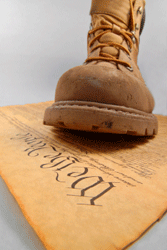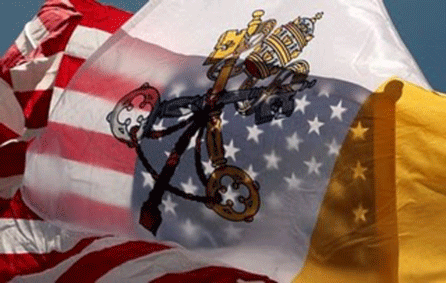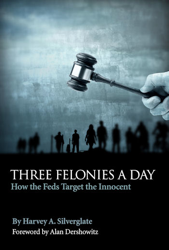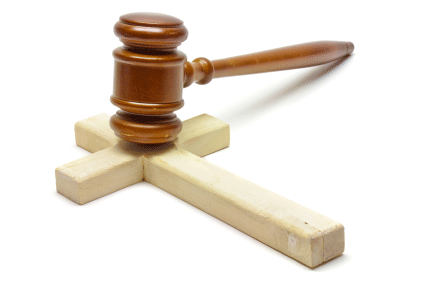A Treacherous Descent: Religious Freedom in America Put to the Test
 A pending U.S. Supreme Court decision in Hosanna-Tabor Evangelical Lutheran Church v. EEOC could forever alter freedom of religion and conscience in America. In "The Twilight's Last Gleaming" posted on These Stone Walls about this time last year, I profiled a compelling article in USA Today by Boston University religion professor Stephen Prothero ("Let's teach religion in schools," The Forum, Oct. 4, 2010). I described the results of a Pew Research Center survey of religious awareness In 'America, and it wasn't a pretty picture. For our Canadian readers, I'm sure that by "America" USA Today means the United States of America. However my own roots, and much of my family, are Canadian - Newfoundland, to be exact - and I doubt very much that the Pew Center results would be much different in Canada.Stephen Prothero described the rather shocking result that, as a group, American atheists scored higher than Catholics, Protestants, Jews, Muslims, or Mormons – or for that matter, any organized faith – in a survey of general religious knowledge and awareness. The results were dismal. Atheists scored an average of 66% on the survey while Catholics averaged only 47%.Other Christian denominations did just a little better than Catholics, but still flunked. The average score for all Americans was 50% - a solid "F." In the survey only 42% of Catholics were able to identify the Book of Genesis as the first book of the Bible. In "Sitting in Your Own Pew," a subsequent post last March, I reproduced a segment of the survey for TSW readers to have a go at it.The point that both Stephen Prothero and I made is that religion is a major factor in the lives of most of the world's peoples and cultures, and the root of many disputes. U.S. foreign policy requires a depth of knowledge about the faiths of others, but Americans as a whole are woefully ignorant of both their own faith traditions and those of other cultures.I'm not sure if it's a result of a religiously challenged America or just one of its many symptoms, but there's a new front taking shape in the culture war. Its outcome could open the door for government intrusion into the tenets and practices of your faith in a way that would make the Founding Fathers and framers of our Constitution and Bill of Rights most uncomfortable.A brief account of this story was presented in USA Today by Thomas S. Kidd, an American history and freedom of religion expert at Baylor University ("Time for government to butt out," Oct. 3, 2011). Here's what happened: Cheryl Perich was a teacher at the Hosanna-Tabor Evangelical Lutheran Church in Michigan. She was dismissed from her post In 2004. She suffered from unpredictable bouts of narcolepsy which the church deemed rendered her unable to continue teaching there. Instead of appealing her dismissal through church sponsored appeal procedures, or seeking a settlement with the church, she filed suit citing the Americans with Disabilities Act in a bid to force the church to rehire her.The church's position has been that Ms. Perich's teaching responsibility was a ministry to which she was "called" by the church. The U.S. Justice Department under the Obama administration signed on to represent the Equal Employment Opportunity Commission (EEOC) in prosecuting the case.The position of these government entities has been that Ms. Perich taught a variety of subjects besides religion at the school - just as would most teachers in most Catholic schools. Therefore, in the government’s view, her duties were not exclusively, or even predominantly, religious. The case wound its way through the lower courts with rulings in favor of the teacher and against the church. It's easy to empathize with the teacher in such a case. No one wants to see any church dismiss anyone without due process and just cause though I'll let pass, for now, the fact that it routinely happens to Catholic priests).RELIGION IN THE PUBLIC SQUAREThe part of this case that strikes at the heart of Constitutional protections from government meddling for religious organizations is what's called the "ministerial exemption" as it relates to the employment of workers in a religious ministry - such as a Lutheran or Catholic school. The Department of Justice has launched an aggressive departure from precedent in this case by arguing that the ministerial exemption, "if it even exists," is to be read very narrowly, applying only to clergy, and even then only when their duties are "exclusively religious."The problems with the Justice Department's view are too many to count, and a ruling in its favor could have far-reaching and profound implications for all faiths - including, perhaps even especially, the Catholic Church in America. It could open the door, for example, for a Catholic hospital to be sued for declining to hire a physician who has been a notorious abortionist. Under the narrow argument of the Justice Department, a hospital might be Catholic but medical procedures are not. Therefore a doctor’s medical treatment could be seen as entirely separate from any religious activity for which the Church sponsors his employment.Catholic schools could lose all control over the standards by which they hire and supervise teachers who teach any subject besides religion. Even Catholic priests who perform any duty that is not specifically religious - such as parish administration - could be seen as being merely "employed" rather than ordained.In an eye-opening column in The Wall Street Journal (“Washington Wants a Say Over Your Minister," October 5, 2011) Michael W. McConnell wrote:
A pending U.S. Supreme Court decision in Hosanna-Tabor Evangelical Lutheran Church v. EEOC could forever alter freedom of religion and conscience in America. In "The Twilight's Last Gleaming" posted on These Stone Walls about this time last year, I profiled a compelling article in USA Today by Boston University religion professor Stephen Prothero ("Let's teach religion in schools," The Forum, Oct. 4, 2010). I described the results of a Pew Research Center survey of religious awareness In 'America, and it wasn't a pretty picture. For our Canadian readers, I'm sure that by "America" USA Today means the United States of America. However my own roots, and much of my family, are Canadian - Newfoundland, to be exact - and I doubt very much that the Pew Center results would be much different in Canada.Stephen Prothero described the rather shocking result that, as a group, American atheists scored higher than Catholics, Protestants, Jews, Muslims, or Mormons – or for that matter, any organized faith – in a survey of general religious knowledge and awareness. The results were dismal. Atheists scored an average of 66% on the survey while Catholics averaged only 47%.Other Christian denominations did just a little better than Catholics, but still flunked. The average score for all Americans was 50% - a solid "F." In the survey only 42% of Catholics were able to identify the Book of Genesis as the first book of the Bible. In "Sitting in Your Own Pew," a subsequent post last March, I reproduced a segment of the survey for TSW readers to have a go at it.The point that both Stephen Prothero and I made is that religion is a major factor in the lives of most of the world's peoples and cultures, and the root of many disputes. U.S. foreign policy requires a depth of knowledge about the faiths of others, but Americans as a whole are woefully ignorant of both their own faith traditions and those of other cultures.I'm not sure if it's a result of a religiously challenged America or just one of its many symptoms, but there's a new front taking shape in the culture war. Its outcome could open the door for government intrusion into the tenets and practices of your faith in a way that would make the Founding Fathers and framers of our Constitution and Bill of Rights most uncomfortable.A brief account of this story was presented in USA Today by Thomas S. Kidd, an American history and freedom of religion expert at Baylor University ("Time for government to butt out," Oct. 3, 2011). Here's what happened: Cheryl Perich was a teacher at the Hosanna-Tabor Evangelical Lutheran Church in Michigan. She was dismissed from her post In 2004. She suffered from unpredictable bouts of narcolepsy which the church deemed rendered her unable to continue teaching there. Instead of appealing her dismissal through church sponsored appeal procedures, or seeking a settlement with the church, she filed suit citing the Americans with Disabilities Act in a bid to force the church to rehire her.The church's position has been that Ms. Perich's teaching responsibility was a ministry to which she was "called" by the church. The U.S. Justice Department under the Obama administration signed on to represent the Equal Employment Opportunity Commission (EEOC) in prosecuting the case.The position of these government entities has been that Ms. Perich taught a variety of subjects besides religion at the school - just as would most teachers in most Catholic schools. Therefore, in the government’s view, her duties were not exclusively, or even predominantly, religious. The case wound its way through the lower courts with rulings in favor of the teacher and against the church. It's easy to empathize with the teacher in such a case. No one wants to see any church dismiss anyone without due process and just cause though I'll let pass, for now, the fact that it routinely happens to Catholic priests).RELIGION IN THE PUBLIC SQUAREThe part of this case that strikes at the heart of Constitutional protections from government meddling for religious organizations is what's called the "ministerial exemption" as it relates to the employment of workers in a religious ministry - such as a Lutheran or Catholic school. The Department of Justice has launched an aggressive departure from precedent in this case by arguing that the ministerial exemption, "if it even exists," is to be read very narrowly, applying only to clergy, and even then only when their duties are "exclusively religious."The problems with the Justice Department's view are too many to count, and a ruling in its favor could have far-reaching and profound implications for all faiths - including, perhaps even especially, the Catholic Church in America. It could open the door, for example, for a Catholic hospital to be sued for declining to hire a physician who has been a notorious abortionist. Under the narrow argument of the Justice Department, a hospital might be Catholic but medical procedures are not. Therefore a doctor’s medical treatment could be seen as entirely separate from any religious activity for which the Church sponsors his employment.Catholic schools could lose all control over the standards by which they hire and supervise teachers who teach any subject besides religion. Even Catholic priests who perform any duty that is not specifically religious - such as parish administration - could be seen as being merely "employed" rather than ordained.In an eye-opening column in The Wall Street Journal (“Washington Wants a Say Over Your Minister," October 5, 2011) Michael W. McConnell wrote:
"But the Obama Justice Department has now asked the court to disavow the ministerial exception altogether. This would mean that, in every future case, a court - and not the church - would decide whether the church's reasons for firing or not hiring a minister were good enough . . . is a secular court to decide, for example, whether confining Catholic priests or orthodox rabbis to males is a correct interpretation of Scripture . . . ?"
Michael W. McConnell is director of the Constitutional Law Center at Stanford University. In his WSJ analysis, he presented a summary of the First Amendment declaration that "Congress shall make no law respecting an establishment of religion." It's a history that should not go quietly into the night like much of the rest of American religious awareness.At the time the Puritans landed at what is now Plymouth, Massachusetts in 1620, the established Church of England that they left behind in disgust was entirely government controlled. "Being a Church of England parson essentially made you a government employee," according to Thomas S. Kidd in USA Today (above). In Colonial America, the royal governor of Virginia licensed ministers. The first published writings of James Madison were letters of protest when the Virginia governor jailed Baptist ministers for preaching without a government issued license. Government entanglement with the affairs of religion - and vice versa - was one of the first American imports from abroad.So when framing the Bill of Rights and the first ten Amendments to the Constitution in 1791 - some 171 years after the Mayflower Pilgrims landed at Plymouth - James Madison and the other Founding Fathers of America took care to allow no government powers over religion, and no national denomination.The result was the concept of "freedom of religion" that is widely misunderstood by Americans today. Separation of Church and State was never meant to be a guarantee of freedom FROM religion as American atheists often claim. It was a guarantee of the "free exercise of religion" - the practice of religion free from government interference.THE SUPREME COURT ARGUMENTSOn October 5, 2011, the United States Supreme Court heard oral arguments in Hosanna-Tabor Evangelical Lutheran Church v. EEOC. Joan Biskupic reported on the hearing in USA Today ("Justices hear religious workplace dispute," Oct. 6, 2011). She described how the Justice Department lawyers urged the Supreme Court to consider the case as a simple employment dispute and disregard the fact that a church is involved.In comments from the Court, Justice Sonia Sotomayor insinuated that a ruling in the church's favor might have other consequences. She asked whether a church teacher who reports sexual abuse to the government might be fired for going to outside authorities. While a lower court judge, however, Justice Sotomayor wrote in another case (Bishop v. Amos, 1987) that religious institutions must be "free to select their own leaders, define their own doctrines, and run their own institutions."

Justice Anthony Kennedy, often a deciding vote in contentious cases before the Court, seemed to side with the teacher's plight citing that she was claiming retaliation under disabilities law and "can't even get a hearing." Justices Antonin Scalia and Elena Kagan voiced concerns about the Justice Department position, as did Chief Justice John Roberts who objected to the distinction between religious and secular activities in a religious position:
"That can't be the test. The Pope is a head of state carrying out secular functions. Those are important. So is he not a minister?"
Chief Justice Roberts' comment was the most astute. For the last decade, the Catholic Church in the United States has been bludgeoned by contingency lawyers arguing that a priest is always a priest - 24/7 - and therefore any alleged activity, whether it be religious, secular, or even criminal, is ALWAYS while under the supervision of the Catholic Church. This has been the vicarious liability argument in every lawsuit involving a priest.When convenient, however, just the opposite is argued. In the Justice Department's arguments in the current case, a “job" is only of a ministerial nature when the "employee" is doing something religious. Using this logic, a Church has authority - and any say whatsoever - in employing or retaining a Catholic school teacher only if he/she is exclusively teaching religion. If such an argument succeeds, an openly gay biology teacher who volunteers at an abortion clinic could sue for discrimination if not hired by a Catholic school.CHIPPING AWAY AT RELIGIOUS FREEDOMS Harvey Silverglate, a well known Boston-based lawyer and champion for civil liberties, has a recent book entitled Three Felonies a Day: How the Feds Target the Innocent (Encounter Books, 2009). I'm rather proud to say that Harvey Silverglate is also a reader of These Stone Walls and was our very first subscriber. His book, Three Felonies a Day describes in chilling prose how modern federal criminal laws can be used to target innocent individuals, negotiate precedent-setting settlements, and then use those settlements to further launch an aggressive inroad into the private lives of Americans. Mr. Silverglate wrote:
Harvey Silverglate, a well known Boston-based lawyer and champion for civil liberties, has a recent book entitled Three Felonies a Day: How the Feds Target the Innocent (Encounter Books, 2009). I'm rather proud to say that Harvey Silverglate is also a reader of These Stone Walls and was our very first subscriber. His book, Three Felonies a Day describes in chilling prose how modern federal criminal laws can be used to target innocent individuals, negotiate precedent-setting settlements, and then use those settlements to further launch an aggressive inroad into the private lives of Americans. Mr. Silverglate wrote:
"No social class or profession is safe from this troubling means of social control by the Executive Branch, and nothing less than the integrity of our Constitutional democracy is at stake."
A most glaring example took place in the Diocese of Manchester - my own diocese - and its consequences are directly connected to the matter of religious exception that must now be decided by the U.S. Supreme Court. Writing for the Boston College Law Review, Louisiana State University Law Professor John S. Baker summarized:
"The sexual abuse scandals in the Catholic Church and the financial scandals in corporate America have been unfolding side by side . . . Federal prosecutors were quick to indict both individual corporate executives and companies. As for the Church, state prosecutors have readily prosecuted priests, but have been more hesitant in prosecuting bishops and dioceses. A December 10, 2002 agreement between the Diocese of Manchester and the state's Attorney General, however, has the potential to change the landscape." (44 B.C.L.Rev. 1061, July/Sept. 2003).
In a 2002 push to prosecute individual New Hampshire Catholic priests accused of abuse - though almost none of the claims fell within the existing criminal statute of limitations - prosecutors in the Attorney General's office threatened to charge the Diocese of Manchester under the state's "child endangerment law." It was a misdemeanor charge with a one-year statute of limitations. Legal scholars were bewildered about how such a charge could even be brought forward, let alone succeed in a court of law.Even officials in the Attorney General's office admitted that the theory of law behind their threatened prosecution of the diocese was "novel." Legal scholar John S. Baker, who analyzed documents in the case, called its legal basis "quite a stretch." Professor Baker attributed the climate in which this occurred to abuses by the news media:
" . . . There has been irresponsible reporting about religious leaders in ways that abuse the freedom of the press. But for the climate of public opinion created by the sensational reporting, I doubt the state prosecutors in New Hampshire would have been so bold as to threaten a criminal prosecution of the Diocese." (44 B.C.L. Review, above).
In the practice of American law, and in the arena governed by American courts, it simply isn't supposed to be this way. The news media should not influence this picture at all. It seems the courts themselves have abdicated justice to the "mob justice” sought by a news media that abuses its own freedoms. The problem has been that when Church authorities settle, precedents are set without any court oversight at all just as Attorney Harvey Silverglate warned in his book Three Felonies a Day.The Diocese of Manchester brought about the suppression of its own civil liberties and set a precedent placing every U.S. Catholic diocese at risk for similar prosecutions. Rather than see the case through by challenging its legal basis through court decisions and appeals, the Diocese of Manchester settled it so that the "novel" charges were never tested. The Diocese accepted a state imposed deal that included five years of unconstitutional monitoring of a Catholic diocese by state officials. And even more egregiously unconstitutional, both tax payers and the Diocese itself shared the annual cost of such monitoring.The case currently before the Supreme Court seems an almost natural result of what I have repeatedly called "the settlement game" that has driven the Catholic scandal. In the Boston College Law Review, Professor John S. Baker summarized the grave implications of this capitulation:
"The Church should recognize the New Hampshire settlement for what it potentially is: ‘the camel’s nose inside the tent.’ Over the years, the U.S. Department of Justice has set precedents by bringing and then settling dubious cases against corporations and other business entities. Over time, prosecutors use these unlitigated "precedents" to launch bolder prosecutions, as circumstances permit. This intrusion by a state prosecutor into the jurisdiction of the Church may encourage and be the basis for actions by other state prosecutors.""The decision by the Diocese [of Manchester] to enter into this agreement represents a dangerous capitulation by one diocese that may have created a serious threat to the other dioceses of the United States.” (44 B.C.L.Rev. 1061, July/Sept. 2003).
Over the last decade, this nation has traveled far down this road, but is it already too far? In this matter, ignorance is not bliss. It is dangerous. The stakes are high, not only for religious freedom, but for freedom itself.The Reverend Martin Luther King, Jr. called upon Americans to “Let freedom ring,” but it won’t ring at all if our government takes over the Church bells.

![]()
